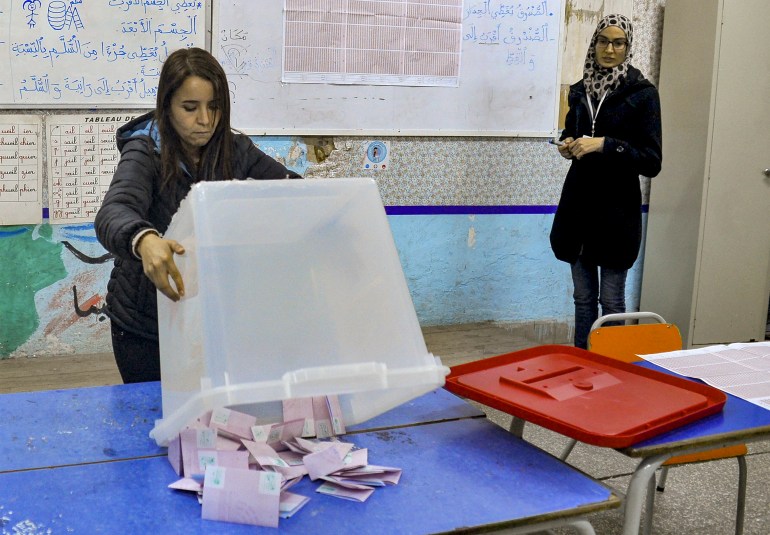A dispute has arisen between Tunisia’s courts and electoral authority that could determine at least the next few years of the country’s future.
Essentially, the dispute is over the eligibility of three candidates in Tunisia’s October 6 presidential election.
More fundamentally, analysts said, it speaks to the durability of the changes ushered in during the 2011 revolution.
How many candidates are running for president?
Three, including President Kais Saied, but whether one of the candidates remains in the race appears uncertain.
Of the 17 candidates who applied to the Independent High Authority for Elections (ISIE) in August, only Zouhair Magzhaoui and Ayachi Zammel were allowed onto the ballot with Saied.
Magzhaoui, of the left-wing nationalist People’s Movement, and Zammel, of the liberal Azimoun party, are not expected to win.
Zammel’s campaign is in trouble after police arrested him on Monday for allegedly falsifying endorsements.
Mahdi Abdel Jawad, a member of his team, said it was to discourage Zammel from running.
Zammel can still run despite being detained.
So 14 candidates were declared ineligible?
Yes.
Three of them – former ministers Imed Daimi and Mondher Znaidi and opposition leader Abdellatif Mekki – won their appeals of the ISIE’s decision before the Administrative Court last week.
But the ISIE dismissed the ruling, saying at a news briefing accessible only to state media, that the court had not communicated its ruling to the ISIE in the legally mandated 48 hours.
A court spokesperson denied the allegation on the same day.
ISIE chief Farouk Bouasker said its list of three candidates was “definitive” and “not subject to appeal”.

Nobody raised a fuss?
Civil society organisations, human rights groups and labour organisations have objected.
On Tuesday, the Tunisian General Labour Union, the country’s largest trade union, called the ruling “illegal”.
On Saturday and Sunday, 26 Tunisian and international NGOs along with 200 academics and activists signed a letter welcoming the Administrative Court’s decision and demanding pluralism be respected.
“By disregarding the Administrative Court’s rulings, the electoral commission is once again tipping the scales in favour of Saied and making a mockery of this election,” Bassam Khawaja, Middle East and North Africa deputy director at Human Rights Watch, told Al Jazeera.
Khawaja recently published a report calling for the court’s decision to be upheld.
What’s going on between the court and ISIE?
While many were surprised that the Administrative Court would back the three rejected candidates, few were shocked that the ISIE would oppose them.
After Saied dismissed the government, suspended parliament and seized most powers for himself in 2021, the once-respected ISIE was rearranged by decree.
Now, ISIE members may be appointed or dismissed by Saied.
Speaking to Mosaique FM in 2022, then-ISIE President Nabil Bafoun said the body’s authority had collapsed and that, under the new system, Saied stood as “the team, the referee and the goalkeeper. … It is the president’s authoritative body par excellence”.
Why does this matter ?
Tunisia never set up a constitutional or supreme court.
Instead, the Administrative Court has guided the country through some of the most volatile periods in its recent history.
To have its ruling rejected by a body regarded as tied to Saied undermines the rule of law, makes a mockery of the electoral process and undermines the legitimacy of whoever wins the election, Hamza Meddeb of the Carnegie Middle East Centre said.
“This is an unprecedented situation,” Meddeb told Al Jazeera. “It speaks directly to the constitution and … who determines the right to rule.
“It also shows that, despite the repression … under Saied, there remain … those in parts of the judiciary and elsewhere that haven’t been convinced by Saied’s rhetoric,” he said.

Does this mean Saied’s worried he’ll lose?
Not really.
Despite plummeting standards of living, Saied remains relatively popular.
In part, this is down to his censorship of a once-vibrant media that now – beyond a few notable exceptions – rarely hosts voices that counter or challenge the government line.
In 2022, Saied introduced Decree 54, which criminalises spreading online any news deemed untrue by the courts. An unknown number of journalists, commentators and critics have been jailed or prosecuted under it.
Under those threats, self-censorship has become the norm.
Those who do not practise it – such as the magazine Jeune Afrique, which recently featured a critical interview with Meddeb – have found their issues banned in Tunisia.
“Saied is weak. His support is way down on where it was in 2019 [during the previous presidential election],” Meddeb told Al Jazeera.
“There are probably still enough people to buy into his conspiracy theories and blame others – … the West, rich people, migrants or even those who believe in climate change – to see him re-elected.
“However, that he’s resorting to … having ISIE fight his battles for him shows that he’s worried.”
EMEA Tribune is not involved in this news article, it is taken from our partners and or from the News Agencies. Copyright and Credit go to the News Agencies, email news@emeatribune.com Follow our WhatsApp verified Channel





